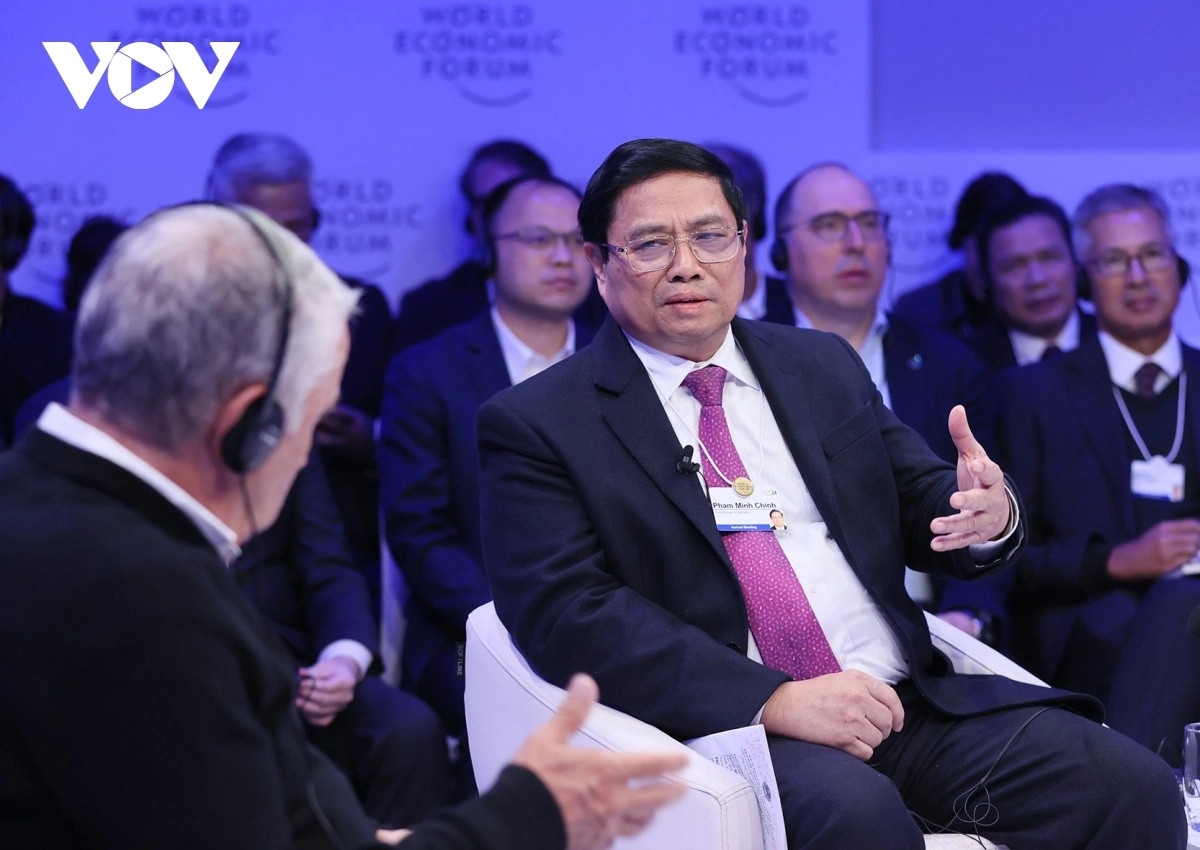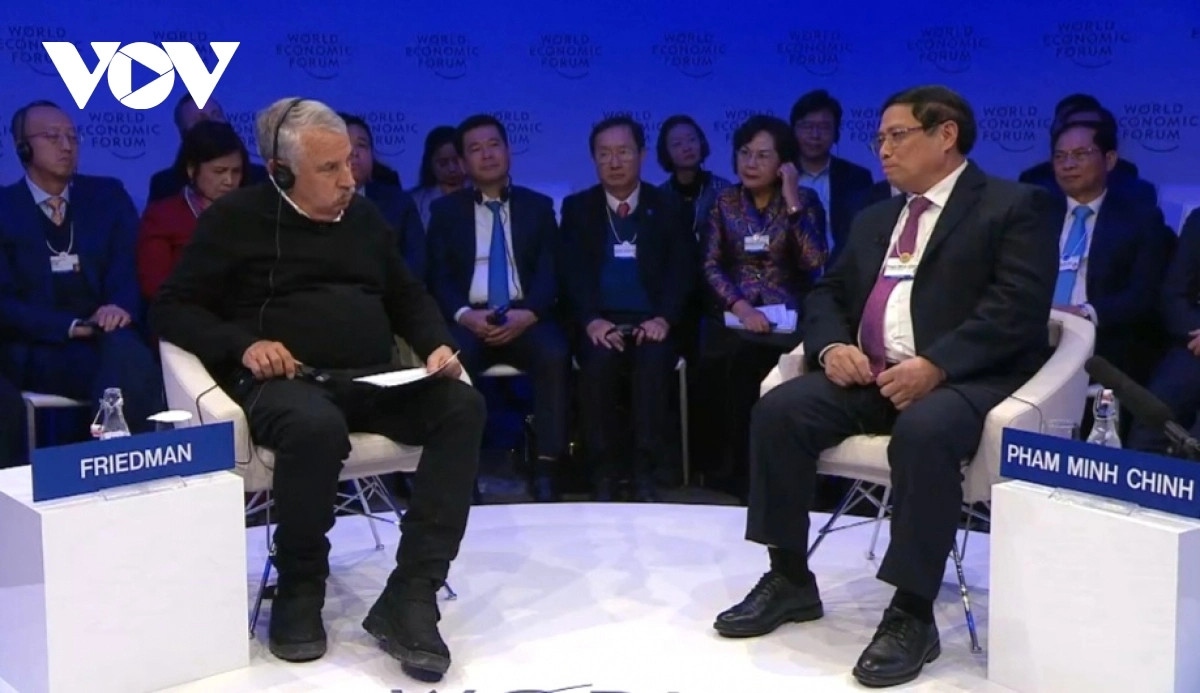
VOV.VN - Prime Minister Pham Minh Chigh outlined Vietnam’s major development orientations in its policy line during a policy dialogue in Davos, Switzerland, on January 16 afternoon (local time) on the sidelines of the 54th annual meeting of the World Economic Forum (WEF) 2024.

The dialogue was attended by Professor Klaus Schwab, founder and executive chairman of WEF, and 100 leaders, representatives of countries, international organizations, corporations, and businesses that are members of WEF. It was moderated by Thomas Friedman, opinion columnist of New York Times.
In his speech, Klaus Schwab noted that Vietnam is not only a rising star in East Asia but is also in the process of transforming into a country with world-class economic influence. He highly appreciated Vietnam’s increasing role, saying it has truly become one of the pioneering countries in developing a green and smart economy.
Meanwhile, Thomas Friedman said Vietnam is a typical example of reform and development, internationally considered a model of rapid and sustainable economic development. He expressed his desire to inquire into Vietnam’s experiences, development orientation and contributions to solving global problems.
In his speech, PM Pham Minh Chinh reaffirmed Vietnam’s consistent policy of building a law-governed socialist state and a socialist-oriented market economy, while developing an independent, self-reliant, and proactive economy with deep, substantive, and effective international economic integration. The country pursues a foreign policy of independence, self-reliance, peace, friendship, cooperation and development. It persists in the ‘four No’s’ defense policy, along with building an advanced culture imbued with national identity.
He highlighted historically significant achievements Vietnam has recorded in implementing the Renewal process for nearly four decades, saying the success was attributed to the country’s steadfast policy line. The country steadfastly pursues the path to socialism, and persists in a foreign policy of independence, self-reliance, multilateralization, and diversification of foreign relations while serving as a good friend, a trusted partner, and a responsible member of the international community. Vietnam promotes the Party's leadership role and the strength of great national unity, while attaching importance to people’s role, considering them history makers.
In line with this, the Prime Minister emphasized the role of international solidarity and multilateralism in addressing global problems. He again highly appreciated people’s role, considering them the most important resource, the driving force and goal of development, noting people need to directly engage in and benefit from policymaking and implementation.

Answering commentator Thomas Friedman’s question about Vietnam’s perspective on balancing relations with major countries, the Prime Minister emphasized that Vietnam is one of the countries that has suffered the most damage since World War II due to wars and embargo. However, it has decided to break with the past, overcome differences, promote similarities, and look to the future, by turning foes into partners.
He said the visit to Vietnam by Party General Secretary and President of China Xi Jinping and US President Joe Biden in 2023 demonstrates strong political trust between Vietnam and the two major world powers, truly testifying to the country’s foreign policy line.
During the dialogue, the PM also emphasized a number of priority areas for Vietnam in the coming time, including digital transformation, science - technology, artificial intelligence, green transformation, and semiconductor manufacturing.
He shared Vietnam’s efforts in developing strategic infrastructure, especially information infrastructure, for the semiconductor industry, saying the country is planning to train 50,000 to 100,000 engineers for the semiconductor industry in the near future.
With regard to artificial intelligence, he said Vietnam would make full use of and at the same time reduce negative limitations of AI. It is now in the process of building a national database, coupled with perfecting policies to attract investment and improve the effectiveness of human resource training.
According to the PM, Vietnam will continue to improve and develop three strategic breakthroughs - institutions, infrastructure, and human resources, in order to create the most favourable conditions for foreign businesses to operate successfully in the country.
The PM also shared Vietnam’s efforts to realize its climate action, saying the country has proactively improved its ability to adapt to landslides, droughts, and other natural disasters. It is implementing a project on developing 1 million hectares of high-quality, low-carbon rice, to meet sustainable development goals and promote the country’s important role in ensuring global food security.
The PM’s messages received great appreciation from delegates attending the dialogue.
VOV.VN - Prime Minister Pham Minh Chinh and senior Vietnamese officials attended a panel discussion with global businesses in Davos, Switzerland, on January 16, examining ways to develop artificial intelligence (AI), automobile technology, semiconductor chips and ecosystems in Vietnam.
VOV.VN - Vietnamese Prime Minister Pham Minh Chinh arrived in Zurich on January 16 morning (local time), beginning his working trip to Switzerland where he will attend the 54th annual meeting of the World Economic Forum (WEF) in Davos at the invitation of WEF founder and executive chairman Klaus Schwab.
Bình luận
Bình luận của bạn sẽ được xét duyệt trước khi đăng